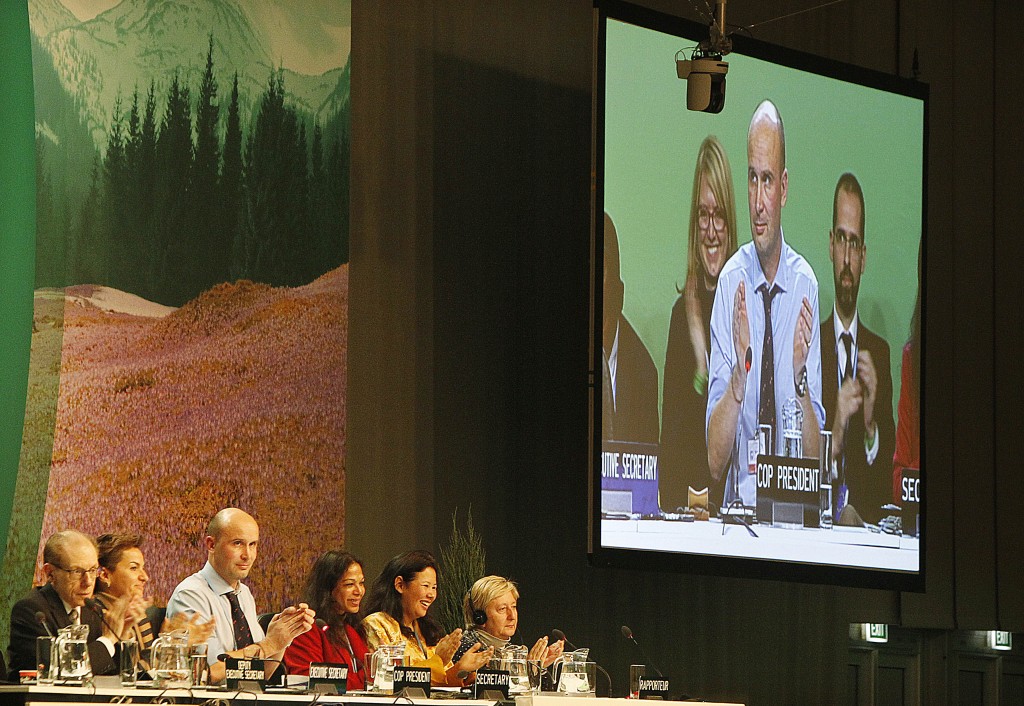UN climate talks falter in extended time

Chairman of UN climate talks, Poland’s Marcin Korolec, 3rd left and seen on screen, sits with presiding delegates as they applaud after gaining approval for part of the final text during the closing session of the UN Climate Change talks in Warsaw, Poland, Saturday Nov. 23, 2013. The talks seemed to teeter on the brink of collapse Saturday as sleep-deprived negotiators continued butting heads over goals to curb global warming, nearly 24 hours into extra time. AP
WARSAW—UN climate talks seemed to teeter on the brink of collapse Saturday as sleep-deprived negotiators continued butting heads over goals to curb global warming, nearly 24 hours into extra time.
“There is a very real chance that these talks could collapse,” said humanitarian group and climate action observer Oxfam, as delegates argued about sharing carbon emissions cuts between rich and poor states, and funding for vulnerable countries.
“Rich countries have rolled back on past promises and, with some middle-income countries, appear to be dodging strong future commitments of climate action,” Oxfam executive director Winnie Byanyima said in a statement.
The belligerent negotiations, gathering more than 190 countries, were to have closed at 1700 GMT on Friday. Twenty hours later, diplomats were still shuttling to and fro to try and break the gridlock.
The Warsaw talks were meant to draft a road map to an ambitious pact to be signed by 2015 to limiting average global warming to 2.0 degrees Celsius (3.6 Fahrenheit) over pre-industrial levels by curbing climate-altering greenhouse gas emissions.
UN nations have agreed that the pact, to be inked in Paris, must enter into effect in 2020.
Representatives of major powers faced off in a plenary meeting around lunchtime that was supposed to adopt a consensus road map, still divided by the same issues that have bedevilled the talks since they opened on November 11.
“There is a serious problem of a lack of balance in the text,” Chinese negotiator Su Wei said of a negotiated draft document, and asked for it to be referred back for further consultations.
Of particular concern to China, India and several other developing nations was language that attaches “commitments” of an equally binding nature to all parties, regardless of their history of greenhouse gas emissions.
Developing nations, their growth largely fueled by fossil fuel combustion, blames the West’s long emissions history for the peril facing our planet, and insist their wealthier counterparts carry a larger responsibility to fix the problem.
“Only developed countries should have commitments,” Su Wei told fellow negotiators on Saturday. Emerging economies could merely be expected to “enhance action.”
The West, though, insists emerging economies must do their fair share, considering that China is now the world’s biggest emitter of CO2, with India in fourth place after the United States and Europe.
China, Brazil, South Africa and India also tabled a proposal on Saturday committing wealthy nations to providing $70 billion per year from 2016 in funding to help poor nations deal with climate-change effects.
“This is the minimum to have clarity and a clear road map to achieving the $100 billion per year” that developed states have already pledged to provide from 2020.
US climate envoy Todd Stern said the last-minute demands amounted to launching new negotiations, “and we don’t think it’s helpful.”
The draft finance agreement, he said, had been the result of a “difficult compromise.”
“If it is reopened as some parties have suggested, we will also have several changes we would like to see made,” Stern warned.
Still grappling with the global economic crisis, the developed world is wary of committing to a detailed long- or short-term funding plan.
The funding crunch lies at the heart of another issue which has also bedevilled the talks: demands by developing countries for a “loss and damage” mechanism to help them deal with future harm from climate impacts they say are too late to avoid.
Rich nations feared this would amount to signing a blank cheque for never-ending liability.
Conference president Marcin Korolec urged parties on Saturday to “carefully consider the implications of not capturing and finalising this important work in Warsaw.”
On current emissions trends, scientists warn the Earth could face warming of 4.0 C or higher over pre-industrial levels—a recipe for catastrophic storms, droughts, floods and land-gobbling sea-level rise that would hit poor countries disproportionally hard.—Mariette Le Roux
